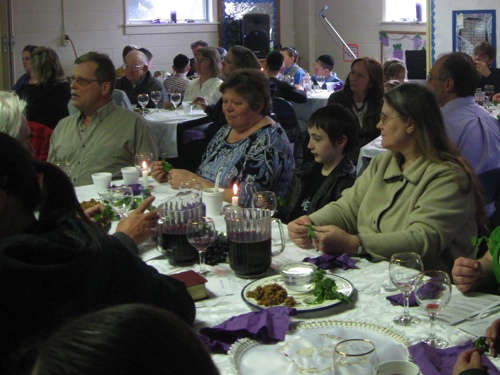A Brief Introduction and Overview
As a Presbyterian Church (USA), we are a part of Christ’s universal church and share with all Christians a belief in the mystery of the trinity and of the incarnation of Jesus Christ as affirmed in the Nicene and Apostle’s Creed. Together with all Protestants, we identify with the Reformation tenets of justification by grace through faith and of Scripture as the final authority for salvation and a life of faith.
Belonging specifically to the family of the Reformed Tradition, we uphold six essential tenets that express our unique identity in the body of Christ.
 The six tenets are:
The six tenets are:
- The Sovereignty of God
- God’s Election for Salvation and Service
- Covenant Life
- The Call to Responsible Stewardship
- The Sin of Idolatry
- The Necessity of Obedience
A person becomes a member of a Presbyterian church by confessing faith in Jesus Christ as Lord and Savior and a desire to faithfully participate in Christ’s work through a particular congregation. Usually membership classes are suggested and a person who has not been baptized would need to receive the sacrament of baptism.
 A person who has been baptized into any other Christian church is received either by letter of transfer or by reaffirmation of faith. Since baptism is into Christ’s church and not a particular local body, we recognize all other baptisms in the Christian tradition as valid and do not re-baptize.
A person who has been baptized into any other Christian church is received either by letter of transfer or by reaffirmation of faith. Since baptism is into Christ’s church and not a particular local body, we recognize all other baptisms in the Christian tradition as valid and do not re-baptize.
The word “Presbyterian” comes from a Greek word meaning “elder” and reflects that our church is governed by a body of representative individuals who are elected from the congregation to work together to discern the voice and will of God for the congregation and its mission in the world. Our system of government sets us apart from denominations that are governed either from the top down in an episcopal type of system or from bottom up approach as in a congregational polity. We are known as “People of the Middle Way” and as Presbyterians, nearly all of our power rests in the body of elders known as the Session.
We elect people to represent us at all levels of the church councils. The next level is Presbytery. It is composed of elders and pastors, in equal numbers, and they govern over the churches in a small geographical area. The Synod level governs a larger geographical area and is composed of elders and pastors elected by the Presbytery. General Assembly is a national body composed of elders and pastors elected from the Presbytery level.
As Presbyterians, we practice two sacraments: baptism and communion. In baptism, we recognize both infant and adult baptism. We baptize by immersion, pouring or sprinkling. Our communion table is open to all who believe in Christ as their Lord and Savior.
We are a confessional church, and so have a “Book of Confession.” This helps us define more clearly what we believe as a church. Along with the “Book of Confession,” we have a “Book of Order.” The “Book of Order” spells out our form of government, forms of discipline, and a directory for the service of Worship of God. These two books, whose authority is under Scripture, make up our church constitution.
We have a rich and meaningful heritage and will happily share more fully with you through a membership class or pastoral visit.
